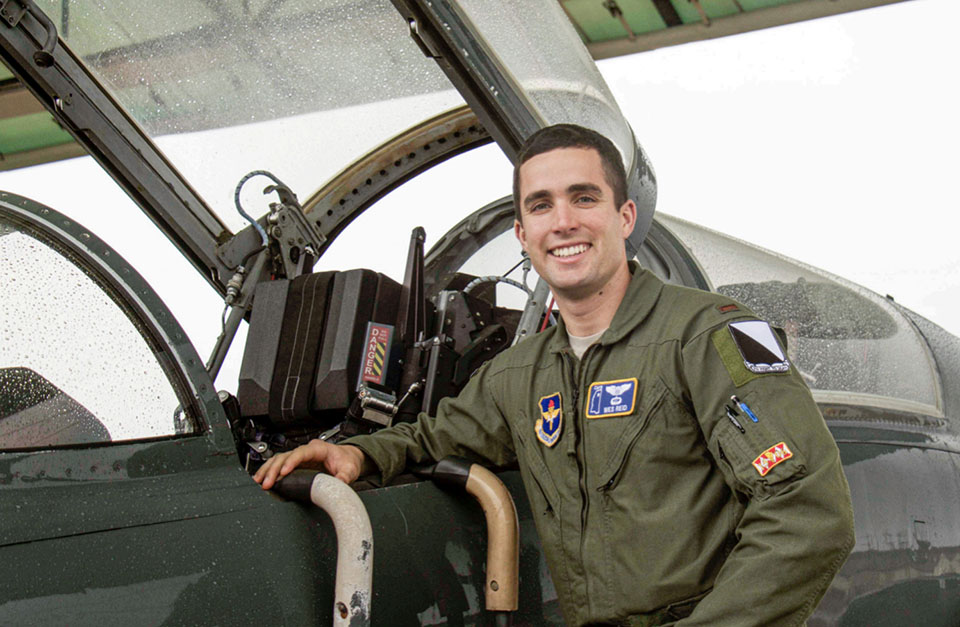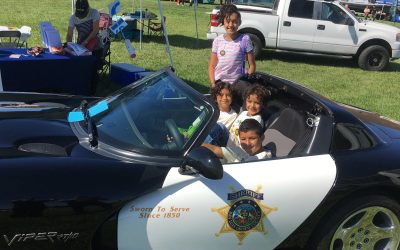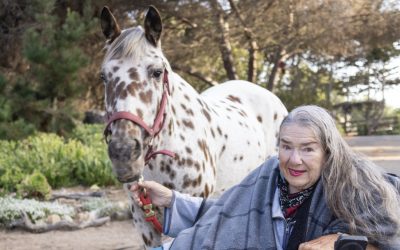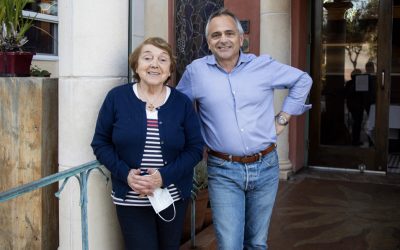Just 12 days after his graduation from San Luis Obispo High School in 2009, 17-year-old Wes Reid boarded a plane bound for Colorado Springs where he would begin basic training at the celebrated United States Air Force Academy. Today, Reid is an Air Force Captain stationed in Phoenix Arizona where he trains other fighter pilots and is the leader of an organization called Fighter Country Spark. His journey from here to there, and back again, is a lesson in self-sacrifice, determination, and true patriotism.
Born and raised on the Central Coast (San Luis Obispo and Atascadero), Capt. Reid recalls an idyllic childhood characterized by safety, freedom, endless beauty, and nearly perfect weather. His father was a Chief Deputy with the San Luis Obispo Sheriff’s Office and his mother worked as a lab technician in the Biological Sciences Department at Cal Poly. He has one older sister and two “adopted” sisters.
Drawn to the industrial arts as a teenager, Capt. Reid loved to tinker and build things from an early age, spending lots of time in his par- ents’ workshop. For his sixteenth birthday, Wes was given his grand- father’s 1970 Chevy El Camino that he lovingly restored and painted white with black racing stripes.
He graduated from the US Air Force Academy in 2013 with a degree in Political Science and a minor in Philosophy. From Colorado Springs, then Lieutenant Reid moved to Columbus Mississippi where he spent a year and a half in undergraduate pilot training.
Born and raised on the Central Coast (San Luis Obispo and Atascadero), Capt. Reid recalls an idyllic childhood characterized by safety, freedom, endless beauty, and nearly perfect weather. His father was a Chief Deputy with the San Luis Obispo Sheriff’s Office and his mother worked as a lab technician in the Biological Sciences Department at Cal Poly. He has one older sister and two “adopted” sisters.
Drawn to the industrial arts as a teenager, Capt. Reid loved to tinker and build things from an early age, spending lots of time in his par- ents’ workshop. For his sixteenth birthday, Wes was given his grand- father’s 1970 Chevy El Camino that he lovingly restored and painted white with black racing stripes.
He graduated from the US Air Force Academy in 2013 with a degree in Political Science and a minor in Philosophy. From Colorado Springs, then Lieutenant Reid moved to Columbus Mississippi where he spent a year and a half in undergraduate pilot training.
“The Air Force is heavily focused on the technological aspects of warfare, not on guns and shooting the bad guys,” Capt. Reid explained. “Being a pilot gave me a chance to be on the operational side of the Air Force, part of a combat wing.”
The training was intense, requiring 6-day work weeks where the academics were as challenging as the flying was. In a class of 27, only 3 were selected for the Fighter/Bomber track where the training for flying fighter jets intensified. Capt. Reid was among them. After six months, his cohort of 3 was reduced to 2, and Wes was now one of just two selected to fly fighters. He would spend an additional two months in a fighter fundamentals course where he learned how to fly in close air-to-air engagement between two fighter jets (often referred to as “dogfighting”).
The training was intense, requiring 6-day work weeks where the academics were as challenging as the flying was. In a class of 27, only 3 were selected for the Fighter/Bomber track where the training for flying fighter jets intensified. Capt. Reid was among them. After six months, his cohort of 3 was reduced to 2, and Wes was now one of just two selected to fly fighters. He would spend an additional two months in a fighter fundamentals course where he learned how to fly in close air-to-air engagement between two fighter jets (often referred to as “dogfighting”).
Next up was another month of training in a program called SERE (Survival Evasion Resistance & Escape) learning how to survive in the water and behind enemy lines. Then it was on to San Antonio Texas for a yearlong basic course in flying the F-16 “Fighting Falcon”. This course focused on how to tactically employ the aircraft; advanced formations, shooting missiles, and dropping bombs were the bulk of the coursework. After graduating, he then joined his first operational unit in Spangdahlem, Germany, where he would spend three years qualifying as a combat mission-ready wingman and then as a flight lead. His squadron focused on the suppression of enemy air defenses (SEAD) in the European Theater.
Calling his time in Germany “awesome,” Capt. Reid then moved to another F-16 base in South Korea where he would spend a year as a member of a frontline unit training for a potential war with North Korea. It was after completion of that assignment that he received orders to become an instructor pilot in Phoenix. Capt. Reid loves teaching the basic course to others who feel as passionately as he does about flying fighter jets. “It’s so cool to watch their development as they learn to do these incredibly difficult maneuvers,” he said. And he is equally enthusiastic about his work with Fighter Country Spark.
Calling it “an Air Force-wide grassroots effort to accelerate change,” Capt. Reid describes his role in Spark as an “idea actualizer.” Spark was formed to identify ways (ideas) to increase the value of the Air Force’s role in the military complex, to improve how the Air Force does business. At his base in Phoenix (Luke AFB), Capt. Reid and his team focus on streamlining the sortie production process, and how to increase the rate at which Airmen learn.
For example, in the past, the Air Force tracked the launch and recovery of aircraft with pen and paper. It’s a large, complicated, and difficult endeavor. Spark members created a shared, collaborative dashboard that streamlines that process, making it more ac- curate and less cumbersome. It’s just one of many innovations intended to improve our chances of winning in a combat situation.
Calling his time in Germany “awesome,” Capt. Reid then moved to another F-16 base in South Korea where he would spend a year as a member of a frontline unit training for a potential war with North Korea. It was after completion of that assignment that he received orders to become an instructor pilot in Phoenix. Capt. Reid loves teaching the basic course to others who feel as passionately as he does about flying fighter jets. “It’s so cool to watch their development as they learn to do these incredibly difficult maneuvers,” he said. And he is equally enthusiastic about his work with Fighter Country Spark.
Calling it “an Air Force-wide grassroots effort to accelerate change,” Capt. Reid describes his role in Spark as an “idea actualizer.” Spark was formed to identify ways (ideas) to increase the value of the Air Force’s role in the military complex, to improve how the Air Force does business. At his base in Phoenix (Luke AFB), Capt. Reid and his team focus on streamlining the sortie production process, and how to increase the rate at which Airmen learn.
For example, in the past, the Air Force tracked the launch and recovery of aircraft with pen and paper. It’s a large, complicated, and difficult endeavor. Spark members created a shared, collaborative dashboard that streamlines that process, making it more ac- curate and less cumbersome. It’s just one of many innovations intended to improve our chances of winning in a combat situation.
For Capt. Reid, being the “lead” member of the Spark Cell is a chance to help preserve a way of life in America that has become increasingly fragile. His education in political science and philosophy forms a strong foundation for Capt. Reid’s understanding of differing systems of government, the value of international relationships, and the role of warfare in human history. He believes that Western democracy is a mere blip on the human history radar screen, protected and, in part, maintained by the dominance of the American military.
Though he recognizes the challenges facing America, Capt. Reid sees a big difference between the U.S. and other nations in that we publically address our flaws. That where we see injustice around the world, we use our “military might” to crush the oppressor. A big fan of the great philosopher, John Stuart Mill, Capt. Reid believes in trying everything else (but war) first, but that war is sometimes a necessary evil.
“War is an ugly thing,” wrote Mill, “but not the ugliest of things: the decayed and degraded state of moral and patriotic feeling which thinks that nothing is worth a war, is much worse. … A war to protect other human beings against tyrannical injustice, to give victory to their own ideas of right and good … is often the means of their regeneration.”
“War is an ugly thing,” wrote Mill, “but not the ugliest of things: the decayed and degraded state of moral and patriotic feeling which thinks that nothing is worth a war, is much worse. … A war to protect other human beings against tyrannical injustice, to give victory to their own ideas of right and good … is often the means of their regeneration.”
“I’m very concerned with how to win the next war,” says Capt. Reid, who admits to being a pragmatist at heart. “Our air game is fantastic,” he explains, “but our ground game needs improvement. One of my focuses for the future of Spark is to figure out how to get our jets airborne faster.”
For his own future, Capt. Reid sees himself as a career officer, and a fighter pilot. When asked about his personal life, Capt. Reid lit up, describing how he met his wife Andrea—“my favorite subject”—and the birth of his one-year-old son, James. As a brand-new father, Capt. Reid has two other goals: to return to the Central Coast when his service is over, and “… to raise my son in a society where he is respected and valued for his diverse thoughts.”
Living in other states and around the world has taught him that the Central Coast really does live up to its moniker—“the happiest place in America”—and that what we have here is fragile. “I wanted to be a part of what keeps it from breaking,” he said.
In his career, Capt. Reid looks forward to strengthening his tactical knowledge of air combat, to a focus on winning battles, and to build- ing the teams that will ensure American military dominance. “I love the sense of purpose that the military gives me,” he says. Because, in the words of John Stuart Mill, “A man who has nothing he is willing to fight for, nothing he cares more about than his personal safety, is a miserable creature who has no chance of being free, unless made and kept so by the exertions of better men than himself.”
Though he would never say so himself, those who know him well will tell you that Captain Wes “Rock” Reid is one of those better men.
For his own future, Capt. Reid sees himself as a career officer, and a fighter pilot. When asked about his personal life, Capt. Reid lit up, describing how he met his wife Andrea—“my favorite subject”—and the birth of his one-year-old son, James. As a brand-new father, Capt. Reid has two other goals: to return to the Central Coast when his service is over, and “… to raise my son in a society where he is respected and valued for his diverse thoughts.”
Living in other states and around the world has taught him that the Central Coast really does live up to its moniker—“the happiest place in America”—and that what we have here is fragile. “I wanted to be a part of what keeps it from breaking,” he said.
In his career, Capt. Reid looks forward to strengthening his tactical knowledge of air combat, to a focus on winning battles, and to build- ing the teams that will ensure American military dominance. “I love the sense of purpose that the military gives me,” he says. Because, in the words of John Stuart Mill, “A man who has nothing he is willing to fight for, nothing he cares more about than his personal safety, is a miserable creature who has no chance of being free, unless made and kept so by the exertions of better men than himself.”
Though he would never say so himself, those who know him well will tell you that Captain Wes “Rock” Reid is one of those better men.





